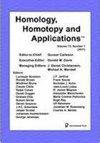谱序列的同调理论
IF 0.5
4区 数学
Q2 MATHEMATICS
引用次数: 0
摘要
让 $R$ 是一个有单元的交换环。我们考虑 $R$ 模量的谱序列类别的同调理论,该类别的弱等价性由那些在某个固定页面诱导准同构的形态给出。我们证明,它的结构接近于布朗意义上的纤维对象范畴,特别是具有纤维对象的部分布朗范畴的结构。我们将其与多复数和滤波复数范畴的相关结构进行比较。本文章由计算机程序翻译,如有差异,请以英文原文为准。
Homotopy theory of spectral sequences
Let $R$ be a commutative ring with unit. We consider the homotopy theory of the category of spectral sequences of $R$-modules with the class of weak equivalences given by those morphisms inducing a quasi-isomorphism at a certain fixed page. We show that this admits a structure close to that of a category of fibrant objects in the sense of Brown and in particular the structure of a partial Brown category with fibrant objects. We use this to compare with related structures on the categories of multicomplexes and filtered complexes.
求助全文
通过发布文献求助,成功后即可免费获取论文全文。
去求助
来源期刊
CiteScore
1.10
自引率
0.00%
发文量
37
审稿时长
>12 weeks
期刊介绍:
Homology, Homotopy and Applications is a refereed journal which publishes high-quality papers in the general area of homotopy theory and algebraic topology, as well as applications of the ideas and results in this area. This means applications in the broadest possible sense, i.e. applications to other parts of mathematics such as number theory and algebraic geometry, as well as to areas outside of mathematics, such as computer science, physics, and statistics. Homotopy theory is also intended to be interpreted broadly, including algebraic K-theory, model categories, homotopy theory of varieties, etc. We particularly encourage innovative papers which point the way toward new applications of the subject.

 求助内容:
求助内容: 应助结果提醒方式:
应助结果提醒方式:


